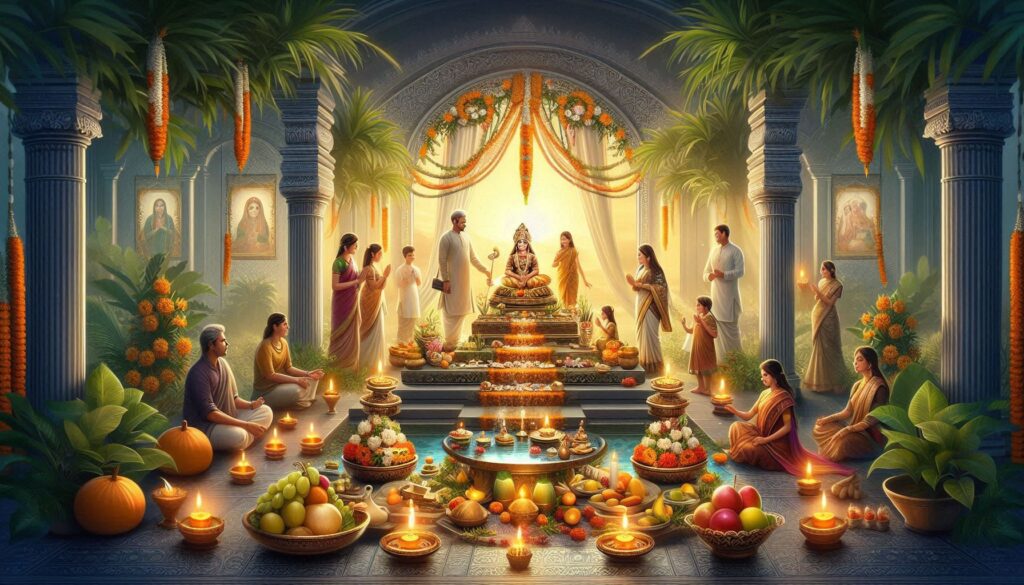In Sanatan Dharma, Shraddha holds an extremely sacred place. During the 15 days of Pitru Paksha, each lunar date is dedicated to specific ancestors. In this sequence, the fifth day of Pitru Paksha is called Panchami Shraddha, also known as Kunwara Panchami.
This day is especially for the peace of those ancestors’ souls who passed away in an unmarried state. Performing Shraddha for such ancestors provides them satisfaction and peace.
2. When is Panchami Shraddha in 2025?
According to the Hindu Panchang, in the year 2025, Panchami Shraddha will be observed on Thursday, 11 September 2025.
On this day, family members bathe, wear clean clothes, and perform Shraddha, tarpan, pind daan, and Brahmin feeding for their ancestors.
3. Significance of Panchami Shraddha
(a) Peace for Unmarried Ancestors’ Souls
The main purpose of Panchami Shraddha is to provide peace and satisfaction to those souls who never got married.
For ancestors who passed away in an unmarried state, this Shraddha leads them closer to liberation.
(b) Religious Belief
The scriptures state that Panchami Tithi is dedicated to those ancestors who never experienced the life of a householder.
Performing rituals on this day satisfies them, and they bestow blessings upon their descendants.
(c) Repayment of Pitru Rin (Debt to Ancestors)
Every person is born carrying three kinds of debts – Deva Rin (towards gods), Rishi Rin (towards sages/teachers), and Pitru Rin (towards ancestors).
The most powerful way to repay Pitru Rin is by performing Shraddha.
By observing Panchami Shraddha, we express gratitude to our unmarried ancestors.
(d) Blessings and Prosperity
The scriptures say –
“Pitarah prāsannā bhavanti, teshām kripayā sarvam shubham bhavati.”
Meaning: When ancestors are pleased, the household is blessed with peace, happiness, and prosperity.
4. Rituals of Panchami Shraddha
(a) Morning Preparations
- Take a holy bath before sunrise and wear clean clothes.
- Sit on a mat of kusha grass at home or in the courtyard, and remember the ancestors with devotion.
(b) Pitru Tarpan
- Offer water mixed with sesame seeds in a sacred river, pond, or well.
- While offering, recite the names, gotra, and tithi of the ancestors.
(c) Pind Daan
- Prepare balls (pindas) of barley, rice, sesame, and ghee, and offer them to the ancestors.
- This ritual is considered the most effective way to satisfy the souls of ancestors.
(d) Worship of Deities
- Lord Shiva – Considered the giver of liberation to ancestors. Offer water, milk, and bilva leaves on a Shiva Linga.
- Mantra: “Om Tryambakam Yajamahe Sugandhim Pushtivardhanam…”
- Lord Vishnu – Worshipped as the protector of ancestors. Recite Vishnu Sahasranama or Vishnu Chalisa.
- Lord Shani – If Panchami Shraddha falls on a Saturday, worship of Lord Shani is especially significant.
- Offer mustard oil, black sesame seeds, and blue/black cloth.
- Mantra: “Om Sham Shanaishcharaya Namah”
(e) Feeding Brahmins and Donations
- Serve Brahmins with respect, offering them sattvic food, and donate clothes, grains, and dakshina.
- Scriptures mention that Brahmin feeding brings true satisfaction to the ancestors.
(f) Important Restrictions
- Avoid non-vegetarian food, alcohol, and tamasic food on this day.
- Refrain from disputes, harsh speech, or inauspicious activities.
- Follow sattvic diet, purity, and devotion during the rituals.
5. Religious Beliefs and Scriptural References
- The Manusmriti and Garuda Purana describe the great importance of Shraddha.
- It is believed that during Pitru Paksha, the souls of ancestors descend to the earthly realm and expect offerings from their descendants.
- Those who perform Shraddha gain blessings, while neglect brings obstacles and hardships in life.
6. Relevance of Panchami Shraddha in Modern Times
Even today, Panchami Shraddha holds as much importance as it did in ancient times.
- It connects us to our roots and culture.
- It strengthens family unity and preserves tradition.
- It instills values of gratitude and respect for ancestors in future generations.
Panchami Shraddha is not just a religious ritual, but a sacred opportunity to express love, respect, and gratitude towards unmarried ancestors.
By performing Shraddha, pind daan, and tarpan with devotion, the ancestors are pleased and bless their descendants.
As a result, the household flourishes with happiness, peace, and prosperity.
